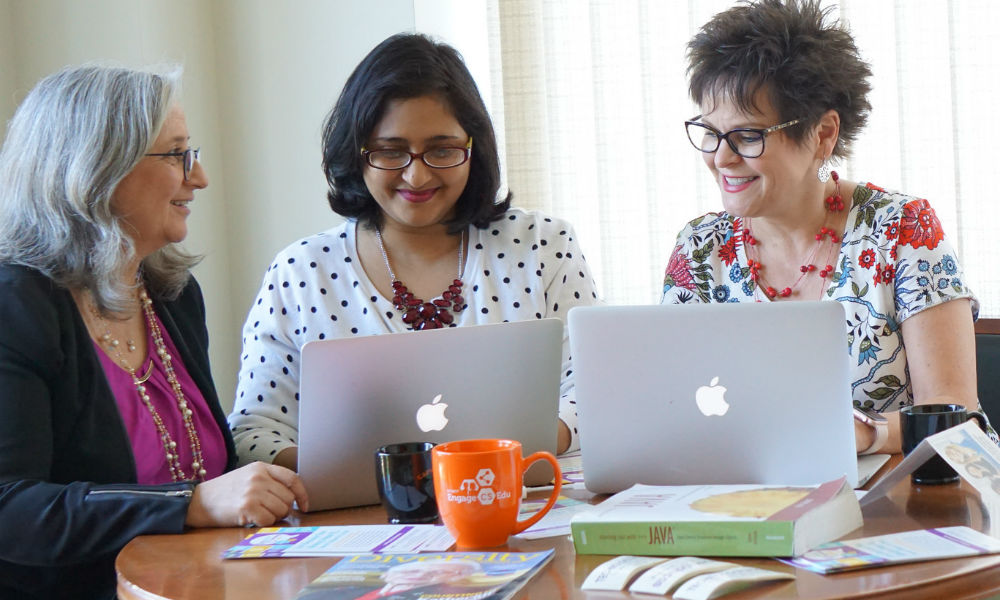CS faculty promote women's involvement in STEM
Computer Science
SUMMARY: Three computer science faculty have taken it upon themselves to organize and lead events focused on fostering inclusive and welcoming gatherings for women aspiring to STEM careers.
By: Brett Seekford
Women’s lack of representation in the fields of science, technology, engineering and mathematics (STEM) is not a new phenomenon in the country’s long struggle with gender inequity. According to statistics from the U.S. Census Bureau in 2009, women make up only 24 percent of employees in STEM-related careers despite serving as 48 percent of the national workforce. While this discrepancy may seem daunting, JMU’s Computer Science Department has made it part of their mission to promote women’s involvement in STEM.
As part of their efforts to establish gender parity in the sciences, three computer science faculty – Farzana Rahman, Sharon Simmons and Dee Weikle – have taken it upon themselves to organize and lead events focused on fostering inclusive and welcoming gatherings for women aspiring to STEM careers.
Both Rahman and Weikle credit their success in a male-dominated field to the encouragement received from their parents. While many women are socialized from a young age to veer away from occupations historically coded “male,” Rahman and Weikle came from families with professional backgrounds in technology who believed women had important insights to related professions.
“I had a great family support system that helped me channel my energy so I can be better prepared and informed about the real-world job in a male-dominated discipline,” Rahman said. “I won’t say there weren’t times when I wanted to quit due to my imposter syndrome or lack of confidence. As I matured, though, I came to understand that the environment is not supportive enough and I just have to hang in there.”
As women who successfully navigated discriminatory obstacles to become academics, they now devote part of their careers to inspiring more women to chart similar paths. For instance, they both help sponsor women-centric events, including the Capital Region Celebration of Women in Computing (CAPWIC) and Dukes Inspiring Girls Into Technology Across Limits (DIGITAL).
CAPWIC serves as a campus conference in which women from varying degrees of experience and interest, from the high-school level all the way to academia, come to present research, facilitate discussions and participate in women-led competitions. Beginning roughly four years ago with around only 40 attendees, the event now hosts close to 300 participants.
DIGITAL, annually organized by JMU’s Women in Technology club, invites primarily underrepresented and minority middle-school students to campus where JMU students and professors present lessons on topics such as programming, mobile app development, robotics, among other topics. The department also partners with high schools and holds community events to introduce people in Harrisonburg to computer science work, as seen in the “CS4VA” and “DiversifyCS” events.
“I have been helped by some of these programs,” Weikle said. “Specifically, when women get together in a venue where the intention is to help each other and support one another, they usually do that. As a result, we all have increased confidence in what we are doing because our concerns are affirmed and we can engage with others who judge us differently yet understand what we are up against,” she added.
Annalea Roeske, a senior computer science major and president of the Women in Technology club, agrees. She has also found it rewarding to serve as a guide for younger women interested in STEM.
“It is very rewarding to work with young women and watch them progress throughout the day [of an event] and through the years. We love seeing them come out excited about technology and hope to inspire them to continue pursuing that interest,” Roeske said.
These events represent a fraction of the endeavors pursued by the Computer Science Department to promote STEM equity, but more work remains.
Weikle, for example, sees mentors as integral to women finding success in male-dominated fields. “I think increased awareness of the impact of long-term relationships with mentors could improve these events, and I have submitted a proposal to Madison Trust to establish just such a program here at JMU,” she said.
Rahman also has plans to continue bridging the gender gap in STEM. She hopes to set up workshops where she will inform valley residents about the opportunities for their daughters in STEM careers.
“I believe, to bring change at large, the change has to begin at home. If the parents cannot plant a seed of passion for STEM in their daughters, the next generation of females will never have enough tools to be aware of their potential and capabilities in these fields,” she said.
In other words, the struggle continues, but JMU faculty and students continue to stand on the frontlines of progress.
